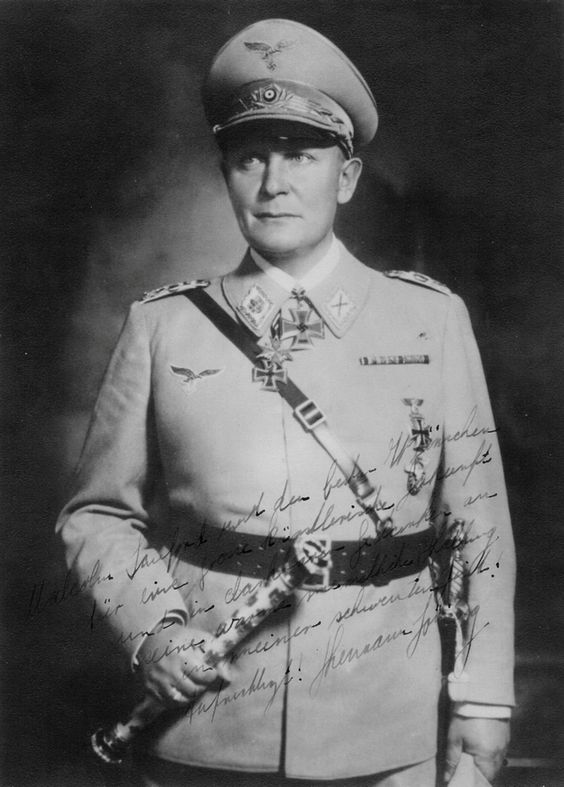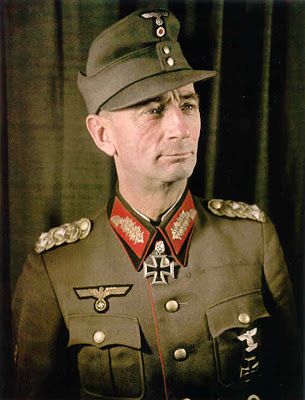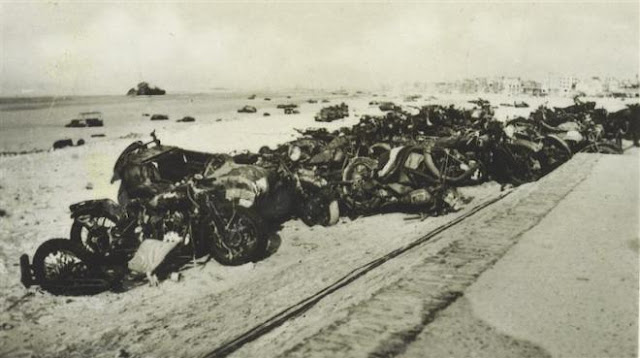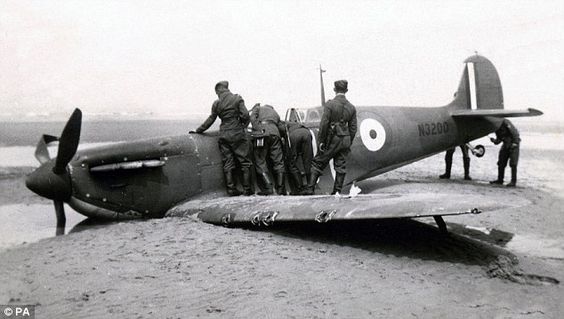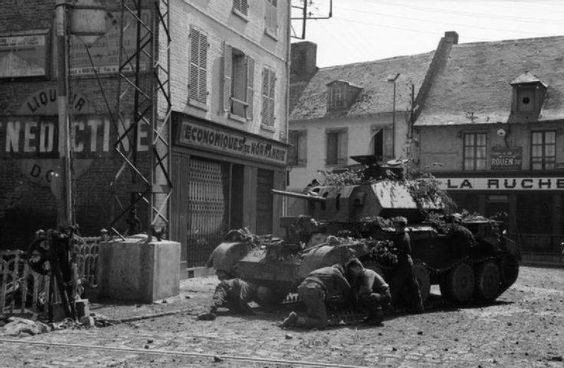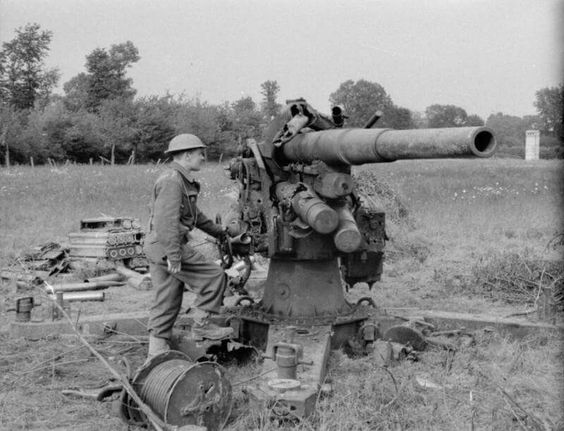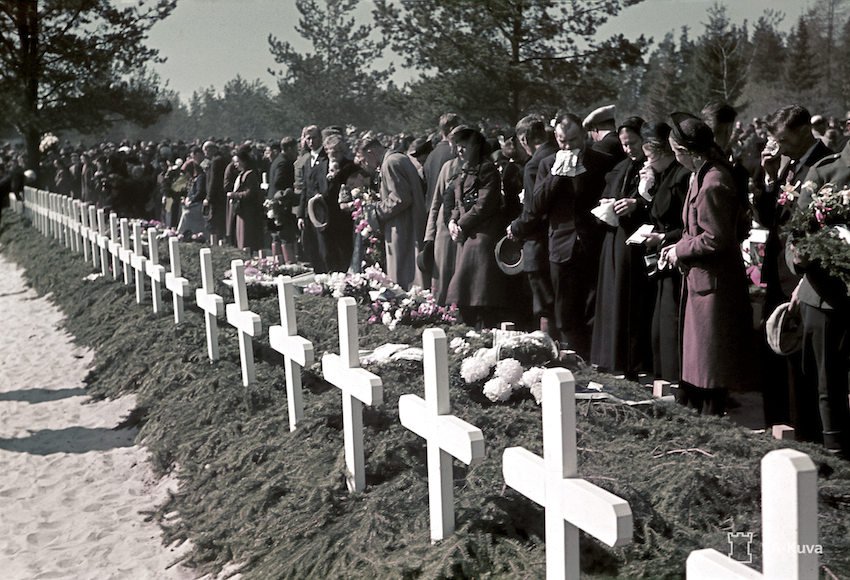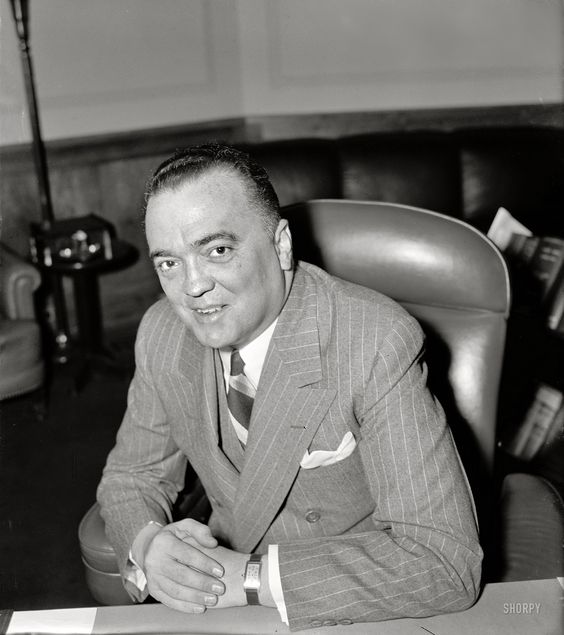German Government: In a speech on 19 July 1940 made to the Reichstag but intended for international distribution, Adolf Hitler confirms the doubts expressed in his 16 July 1940 Directive No. 15 regarding Operation Sea Lion. As stated in the directive, he would prefer not to have to invade England. What he has in mind as a settlement is unknown, but he is the only one making peace offers - the British are adamantly opposed to even considering the idea.
The British government takes its time refusing the peace offer, but the BBC - on its own initiative - immediately rejects it. The Germans use the speech as the basis of a propaganda campaign, dropping leaflets with that theme in London. This is the last open peace proposal of any kind between the UK and Germany before the closing days of the Reich, though there are various half-hearted attempts by the Germans to start some kind of negotiations along the way.
It is easy to dismiss Hitler's proposal. However, to him, it is quite serious - he does not want to invade and probably knows that he can't launch a successful invasion. As for the British, while Churchill is adamantly opposed to the mere idea of negotiations, there is a large faction headed by Lord Halifax within the British War Cabinet that believes there is no harm with at least discussing the matter with the Germans even if nothing comes of it.
Of more importance to the future conduct of the war, Hitler stages the 1940 Field Marshal Ceremony at the Kroll Opera House. For the first time, he elevates Generals to the rank of Field Marshal, a rank banned under the Treaty of Versailles:
As a special gesture toward one of his favorite Generals, Hitler bestows the first Oak Leaves to the Knight's Cross upon Eduard Dietl, who managed to avoid either being defeated or forced to flee into internment in Sweden during the Battle of Narvik. There are other awards, such as the award of the Knight's Cross to Major Michael Pössinger. While military rank, of course, is always important, the huge separate track of medals created by the Wehrmacht is often more important in terms of how a soldier is perceived. A major with a Ritterkreuz has infinitely more status in the eyes of his comrades, for instance than a mere office General. Rank confers power, but top medals grant unique status.
Battle of Britain: Overall, it is a bad day for the RAF, not so much do the number of losses, but what the day means about part of the British fighter force. The weather is fair, good enough for most flying operations.
The Luftwaffe bombs the RAF airfield at Norwich at first light, destroying a hangar.
Bolton Paul Defiants remain front-line fighters for the RAF. In the morning, a formation from RAF No.141 Squadron intercepts some Bf 109Es south of Folkestone during a Luftwaffe raid on shipping. The Messerschmitts make mincemeat of the Defiants, shooting down 6 and damaging another with one loss to themselves. The Battle of Britain shows that 2-seat fighters on both sides are not quite ready for prime-time, especially ones like the Defiants which rather incredibly have no forward armament. More Defiants likely would have been lost if not for the timely intercession of Hurricanes from RAF No. 111 Squadron.
The action is made much, much worse than just the loss of fighters due to the fact that 10 pilots/crew perish. Three Hurricanes go down in the action as well.
The Luftwaffe sends four Dornier Do 17s against the Rolls Royce engine factory at Glasgow. There are 42 casualties.
The Luftwaffe again raids Dover at 14:00 to disperse British Royal Navy ships preparing to meet any invasion. The destroyer HMS Griffin is damaged by near misses. Destroyer HMS Beagle also is damaged off Dover by near misses. The 5574-ton British tanker HMS War Sepoy is damaged by the attack in Dover Harbor and ultimately sinks, used as a blockship. British 550 ton trawler HMS Crestflower also sinks, with two deaths.
During the night, the Luftwaffe sends bombers from KG55 to attack the port of Southampton, with the Germans losing on Heinkel 111.
The Luftwaffe lays mines in the Thames estuary during the night.
Luftwaffe III,/LG1, a Junkers 88 formation based at Lille, has a new Gruppenkommandeur. Hptm. Karl-Friedrich Knust is appointed in place of Major Dr. Ernst Bormann.
European Air Operations: The RAF Bomber Command makes night raids on northern German ports and on Channel ports where barges are being assembled for an invasion. Coastal Command attacks naval bases at Emden and Harlingen. Among the targets is the battleship Tirpitz, still under construction at Wilhelmshaven, and Admiral Scheer.
Battle of the Atlantic: U-62 (Oberleutnant zur See Hans-Bernhard Michalowski) torpedoes and sinks 4581-ton British iron freighter Pearlmoor in the Western Approaches. There are 26 survivors and 13 perish. The ship is a straggler from Convoy Sl-38.
German raider Thor sinks Dutch freighter Tela off Brazil after taking the 33 crew prisoner.
The Kriegsmarine lays mines in the North Sea.
Convoy HX 59 departs from Halifax.
British corvette HMS Bluebell (K 80, Lt. Commander Robert E. Sherwood) is commissioned.
Battle of the Mediterranean: The Australian cruiser HMAS cruiser Sydney, escorted by five destroyers, intercepts Italian cruisers Bartolomeo Colleoni and Giovanni delle Bande Nere off Crete. In the Battle of Cape Spada, the Colleoni sinks and the Sydney and Bande Nere are damaged. Sydney retreats under pressure from Regia Aeronautica bombers, Bande Nere to Benghazi. Royal Navy destroyers pick up 525 survivors from the Bande Nere. RN destroyer Havock is badly damaged by air attack but makes it back to Alexandria.
At Malta, there is an air raid shortly after noontime. Two Gloster Gladiators defending the island are damaged by air raids, but they prevent any bombs from being dropped. There is now only one serviceable aircraft left, aptly nicknamed "Faith." The other two Gladiators and a Hurricane can be repaired with a little time, but reinforcements from Egypt or England are difficult.
Applied Science: The British radar research center (TRE) at Swanage receives its first prototype cavity magnetron.
US/Latin American Relations: Cruisers USS Wichita (CA 45) and Quincy (CA 39), meeting by destroyers Wainwright and Walke, arrive at Rio de Janeiro on their "show the flag" mission. The destroyers transfer a marine contingent to the cruisers.
Soviet/Baltic States Relations: The Soviets continue their purge of former Baltic States leaders. They deport Estonian General Johan Laidoner to Siberia. Others, of course, are simply being shot with little fanfare.
Denmark: The government, under German domination, withdraws from the increasingly irrelevant League of Nations.
British Government: There is a major shakeup of the military.
General Sir Alan Brooke, former commander of the BEF, is appointed Commander in Chief, Home Forces. He replaces General Edmund Ironside. Churchill makes the change because he gets along better with Brooke, who secretly feels that Churchill has a wobbly sense of military strategy. This completes Ironside's dramatic fall from grace since the Battle of France, but at least he is promoted to Field Marshal as he retires.
General Claude Auchinleck, who has been in charge of British Egyptian forces, becomes the commander of Southern Command.
The British Army Intelligence Corps forms. Churchill also wishes for commando operations to be centralized and coordinated in a Special Operations Executive (SOE). He also suggests forming a foreign legion, like the French Foreign Legion.
Canadian Government: The new commander of the Canadian 1st Corps. is General Andrew McNaughton.
Japanese Government: The new government is much more militaristic and looks toward nearby French possessions as possible targets.
American Government: President Roosevelt receives and quickly signs the Vinson-Walsh Act (the Two-Ocean Navy Act). There are 1,325,000 tons of ships and 15,000 naval aircraft authorized in order to create two separate navies on both coasts. The ambitious plan is for 35 battleships, 20 carriers, and 88 cruisers.
Roosevelt accepts the Democratic nomination for President.
British Homefront: The British are setting up internment camps on the Isle of Wight for German and Italian nationals caught up in the war. Conditions are quite poor, with not enough food or shelter. Many of those imprisoned actually are anti-German refugees, but their official documents just list them as German.
Future History: Dennis Cole is born. He becomes famous as an American television actor in such productions as The Love Boat and Charlie's Angels.
July 1940
July 1, 1940: Vichy France
July 2, 1940: Arandora Star
July 3, 1940: Operation Catapult at Mers El Kébir
July 4, 1940: Romania In Crisis
July 5, 1940: The Five Freedoms
July 6, 1940: Hitler's High Point
July 7 1940: Dakar And Ringo
July 8, 1940: Tea Rationing in England
July 9, 1940: Battle of Calabria
July 10, 1940: Battle of Britain Begins
July 11, 1940: "Nous, Philippe Petain"
July 12, 1940: Enter Laval
July 13, 1940: German Surface Raiders Attack!
July 14, 1940: Bastille/Mourning Day
July 15, 1940: Tallest Man Dies
July 16, 1940: Plans for Sea Lion
July 17, 1940: Burma Road Closed
July 18, 1940: FDR Runs Again
July 19, 1940: Last Appeal To Reason
July 20, 1940: First Night Fighter Victory
July 21, 1940: Soviets Absorb Baltic States
July 22, 1940: First RAF Night Fighter Victory
July 23, 1940: Invasion False Alarm
July 24, 1940: The Meknés Incident
July 25, 1940: Black Thursday for RAF
July 26, 1940: Capture The Duke?
July 27, 1940: What's Up, Doc?
July 28, 1940: Destroyers Pulled From Dover
July 29, 1940: Barbarossa On The Burner
July 30, 1940: Hitler Delays Sealion
July 31, 1940: Bloody Wednesday of Olkusz
2020
In this hour, I feel it to be my duty before my own conscience to appeal once more to reason and common sense in Great Britain as much as elsewhere. I consider myself in a position to make this appeal, since I am not a vanquished foe begging favors, but the victor, speaking in the name of reason. I can see no reason why this war need go on. I am grieved to think of the sacrifices it must claim.Hitler adds that if Churchill ignores him, "I shall have relieved my conscience in regard to the things to come." He somewhat dilutes the "peace" offer, though, with some rather fanciful trash talk:
Fighting alone all these weeks on the Channel front, Jagdgeschwader 51 has already shot down 150 of the enemy's aircraft, quite enough to weaken him seriously. Think now of all the bombers we can parade in the English sky. The few R.A.F. fighters will not be able to cope.The timing of the speech suggests that the start of the true Battle of Britain is not 10 July, as the British claim, but August as the Germans maintain. The British date is somewhat arbitrary, as the Luftwaffe had been staging raids during late June. US journalist William Shirer considers the speech a "masterpiece," though of little value as a basis of peace. He considers Hitler the "finest liar in History."
The British government takes its time refusing the peace offer, but the BBC - on its own initiative - immediately rejects it. The Germans use the speech as the basis of a propaganda campaign, dropping leaflets with that theme in London. This is the last open peace proposal of any kind between the UK and Germany before the closing days of the Reich, though there are various half-hearted attempts by the Germans to start some kind of negotiations along the way.
It is easy to dismiss Hitler's proposal. However, to him, it is quite serious - he does not want to invade and probably knows that he can't launch a successful invasion. As for the British, while Churchill is adamantly opposed to the mere idea of negotiations, there is a large faction headed by Lord Halifax within the British War Cabinet that believes there is no harm with at least discussing the matter with the Germans even if nothing comes of it.
Of more importance to the future conduct of the war, Hitler stages the 1940 Field Marshal Ceremony at the Kroll Opera House. For the first time, he elevates Generals to the rank of Field Marshal, a rank banned under the Treaty of Versailles:
- Colonel-General Walther von Brauchitsch
- Colonel-General Fedor von Bock
- Luftwaffe General Albert Kesselring
- Colonel-General Wilhelm Keitel
- Colonel-General Günther von Kluge
- Colonel-General Wilhelm von Leeb
- Colonel-General Wilhelm List
- Colonel-General Erhard Milch
- Colonel-General Walther von Reichenau
- Colonel-General Gerd von Rundstedt
- General Hugo Sperrle
- Colonel-General Erwin von Witzleben
As a special gesture toward one of his favorite Generals, Hitler bestows the first Oak Leaves to the Knight's Cross upon Eduard Dietl, who managed to avoid either being defeated or forced to flee into internment in Sweden during the Battle of Narvik. There are other awards, such as the award of the Knight's Cross to Major Michael Pössinger. While military rank, of course, is always important, the huge separate track of medals created by the Wehrmacht is often more important in terms of how a soldier is perceived. A major with a Ritterkreuz has infinitely more status in the eyes of his comrades, for instance than a mere office General. Rank confers power, but top medals grant unique status.
 |
| Hitler at the Kroll Opera House before the Reichstag, 19 July 1940 (Federal Archive). |
The Luftwaffe bombs the RAF airfield at Norwich at first light, destroying a hangar.
Bolton Paul Defiants remain front-line fighters for the RAF. In the morning, a formation from RAF No.141 Squadron intercepts some Bf 109Es south of Folkestone during a Luftwaffe raid on shipping. The Messerschmitts make mincemeat of the Defiants, shooting down 6 and damaging another with one loss to themselves. The Battle of Britain shows that 2-seat fighters on both sides are not quite ready for prime-time, especially ones like the Defiants which rather incredibly have no forward armament. More Defiants likely would have been lost if not for the timely intercession of Hurricanes from RAF No. 111 Squadron.
The action is made much, much worse than just the loss of fighters due to the fact that 10 pilots/crew perish. Three Hurricanes go down in the action as well.
The Luftwaffe sends four Dornier Do 17s against the Rolls Royce engine factory at Glasgow. There are 42 casualties.
The Luftwaffe again raids Dover at 14:00 to disperse British Royal Navy ships preparing to meet any invasion. The destroyer HMS Griffin is damaged by near misses. Destroyer HMS Beagle also is damaged off Dover by near misses. The 5574-ton British tanker HMS War Sepoy is damaged by the attack in Dover Harbor and ultimately sinks, used as a blockship. British 550 ton trawler HMS Crestflower also sinks, with two deaths.
During the night, the Luftwaffe sends bombers from KG55 to attack the port of Southampton, with the Germans losing on Heinkel 111.
The Luftwaffe lays mines in the Thames estuary during the night.
Luftwaffe III,/LG1, a Junkers 88 formation based at Lille, has a new Gruppenkommandeur. Hptm. Karl-Friedrich Knust is appointed in place of Major Dr. Ernst Bormann.
European Air Operations: The RAF Bomber Command makes night raids on northern German ports and on Channel ports where barges are being assembled for an invasion. Coastal Command attacks naval bases at Emden and Harlingen. Among the targets is the battleship Tirpitz, still under construction at Wilhelmshaven, and Admiral Scheer.
Battle of the Atlantic: U-62 (Oberleutnant zur See Hans-Bernhard Michalowski) torpedoes and sinks 4581-ton British iron freighter Pearlmoor in the Western Approaches. There are 26 survivors and 13 perish. The ship is a straggler from Convoy Sl-38.
German raider Thor sinks Dutch freighter Tela off Brazil after taking the 33 crew prisoner.
The Kriegsmarine lays mines in the North Sea.
Convoy HX 59 departs from Halifax.
British corvette HMS Bluebell (K 80, Lt. Commander Robert E. Sherwood) is commissioned.
 |
| HMAS Sydney. |
At Malta, there is an air raid shortly after noontime. Two Gloster Gladiators defending the island are damaged by air raids, but they prevent any bombs from being dropped. There is now only one serviceable aircraft left, aptly nicknamed "Faith." The other two Gladiators and a Hurricane can be repaired with a little time, but reinforcements from Egypt or England are difficult.
Applied Science: The British radar research center (TRE) at Swanage receives its first prototype cavity magnetron.
US/Latin American Relations: Cruisers USS Wichita (CA 45) and Quincy (CA 39), meeting by destroyers Wainwright and Walke, arrive at Rio de Janeiro on their "show the flag" mission. The destroyers transfer a marine contingent to the cruisers.
Soviet/Baltic States Relations: The Soviets continue their purge of former Baltic States leaders. They deport Estonian General Johan Laidoner to Siberia. Others, of course, are simply being shot with little fanfare.
Denmark: The government, under German domination, withdraws from the increasingly irrelevant League of Nations.
British Government: There is a major shakeup of the military.
General Sir Alan Brooke, former commander of the BEF, is appointed Commander in Chief, Home Forces. He replaces General Edmund Ironside. Churchill makes the change because he gets along better with Brooke, who secretly feels that Churchill has a wobbly sense of military strategy. This completes Ironside's dramatic fall from grace since the Battle of France, but at least he is promoted to Field Marshal as he retires.
General Claude Auchinleck, who has been in charge of British Egyptian forces, becomes the commander of Southern Command.
The British Army Intelligence Corps forms. Churchill also wishes for commando operations to be centralized and coordinated in a Special Operations Executive (SOE). He also suggests forming a foreign legion, like the French Foreign Legion.
Canadian Government: The new commander of the Canadian 1st Corps. is General Andrew McNaughton.
Japanese Government: The new government is much more militaristic and looks toward nearby French possessions as possible targets.
American Government: President Roosevelt receives and quickly signs the Vinson-Walsh Act (the Two-Ocean Navy Act). There are 1,325,000 tons of ships and 15,000 naval aircraft authorized in order to create two separate navies on both coasts. The ambitious plan is for 35 battleships, 20 carriers, and 88 cruisers.
Roosevelt accepts the Democratic nomination for President.
British Homefront: The British are setting up internment camps on the Isle of Wight for German and Italian nationals caught up in the war. Conditions are quite poor, with not enough food or shelter. Many of those imprisoned actually are anti-German refugees, but their official documents just list them as German.
Future History: Dennis Cole is born. He becomes famous as an American television actor in such productions as The Love Boat and Charlie's Angels.
July 1940
July 1, 1940: Vichy France
July 2, 1940: Arandora Star
July 3, 1940: Operation Catapult at Mers El Kébir
July 4, 1940: Romania In Crisis
July 5, 1940: The Five Freedoms
July 6, 1940: Hitler's High Point
July 7 1940: Dakar And Ringo
July 8, 1940: Tea Rationing in England
July 9, 1940: Battle of Calabria
July 10, 1940: Battle of Britain Begins
July 11, 1940: "Nous, Philippe Petain"
July 12, 1940: Enter Laval
July 13, 1940: German Surface Raiders Attack!
July 14, 1940: Bastille/Mourning Day
July 15, 1940: Tallest Man Dies
July 16, 1940: Plans for Sea Lion
July 17, 1940: Burma Road Closed
July 18, 1940: FDR Runs Again
July 19, 1940: Last Appeal To Reason
July 20, 1940: First Night Fighter Victory
July 21, 1940: Soviets Absorb Baltic States
July 22, 1940: First RAF Night Fighter Victory
July 23, 1940: Invasion False Alarm
July 24, 1940: The Meknés Incident
July 25, 1940: Black Thursday for RAF
July 26, 1940: Capture The Duke?
July 27, 1940: What's Up, Doc?
July 28, 1940: Destroyers Pulled From Dover
July 29, 1940: Barbarossa On The Burner
July 30, 1940: Hitler Delays Sealion
July 31, 1940: Bloody Wednesday of Olkusz
2020

